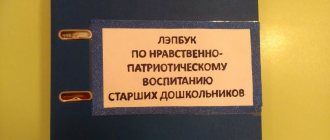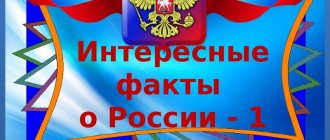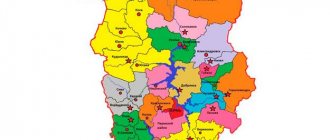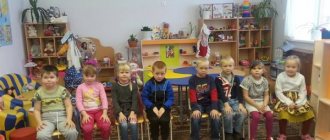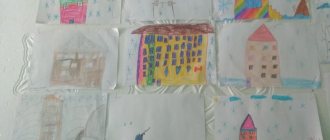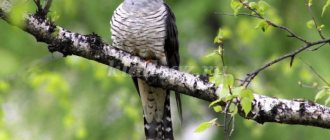MAGAZINE Preschooler.RF
Summary of educational activities in the middle group, taking into account the regional component. Topic: “My Motherland – Cherepovets”Integration of educational areas: “Cognitive development” , “Speech development” , “Socio-communicative development” , “Reading fiction” .
Goal: To consolidate children’s knowledge about their hometown, as about their small homeland.
Software tasks:
Educational: Clarification and consolidation of general ideas about your “small homeland” , hometown. Fixing the names of rivers, streets, avenues, squares, and transport in the city of Cherepovets. Expansion and activation of the dictionary on the topic: “Our city” (due to nouns: city, coat of arms, flag, Cherepovets, river, Sheksna, Yagorba, street, avenue, square, transport).
Developmental: Develop coherent speech through complete answers to questions.
Develop imaginative thinking and memory. Develop attention, imagination, creativity, creating a positive emotional mood in preschoolers.
Educational: Formation of skills of cooperation, mutual understanding, goodwill, patriotism. Cultivate love and a sense of attachment to your hometown. Foster a sense of pride in your hometown.
Methods and techniques:
Visual: showing, viewing, watching.
Verbal: explanation, questions, examination, conversation, comparison, artistic expression.
Practical: D/i “Collect a picture” (Coat of arms of the city of Cherepovets), Low mobility game: “Make the flag of Russia” , slide show “My homeland is Cherepovets” .
Individual work: memorizing poems, text for a character.
Preliminary work: Conversations, reading stories, memorizing poems about the homeland, about the hometown. Examination of illustrations of the Russian flag, the coat of arms of the city of Cherepovets. View photo albums “Cherepovets in different seasons” , “Rivers of Cherepovets” . Looking at photographs of our city’s streets, squares, various buildings, and transport. Collecting photographs and creating a slide show on the topic: “My homeland is Cherepovets .
EQUIPMENT: Costume for the character, audio recordings, video recording of a slide show, cut-out picture of the coat of arms of Cherepovets, colored ribbons (white, blue, red), laptop, music speaker.
Progress of educational activities:
Organizing time. Creating an emotionally positive background.
Children sit on chairs. The sound of a propeller is heard, and Carlson (a child dressed as Carlson) flies into the hall to the music.
Carlson: Do you guys recognize me? I am traveling around your big country of Russia and arrived in your city, but I don’t know anything about it, no streets, no buildings, no addresses, I don’t know which roof to fly to.
Educator: Guys, let's help Carlson find out everything about our city, about our Motherland. (Children's answers)
Carlson: Motherland! And what is it?
Educator: The guys will now tell you the poem: “What we call Motherland” by V. Stepanov and you will understand everything.
1. “What do we call Motherland? The house in which we live and the birch trees along which we walk next to our mother.”
2. “What do we call Motherland? A field with a thin spikelet Our holidays and songs Warm evening outside the window.”
Educator: Homeland is the place where a person was born into a family and lives in his city.
Carlson: And what is the name of your city? (children's answers)
Educator: Our hometown is called Cherepovets. Carlson, listen to these beautiful poems, the children know about our city.
1. Our city has stood on Sheksna for many, many years. He is majestic, proud, from his victories.
2. We love our city, our hometown. It is beautiful in summer, beautiful in winter. He dressed himself in parks, bridges and palaces, which were built by his grandfathers and fathers.
Educator:
— Our city of Cherepovets stands on two rivers: Which children? (Children's answers). That's right, Sheksna and Yagorbe.
— Guys, what streets are there in our city? (children's answers) There are many streets in our city, children tell Carlson which streets you know. (Children's answers) Yes, Lenin Street, Embankment, Leningradskaya, Godovikova and there are many other streets. What prospectuses do you know? (Children's answers) Sovetsky Ave., Sheksninsky Prospekt, Pobeda Ave., etc.
What areas do we know? (Children's answers) Milyutin Square, Metallurgists Square, Chemists Square.
This is how much we know about our city. Now Carlson, we will play a game, and you will try to guess what picture we collected. Game "Collect the picture" . (Coat of arms of the city of Cherepovets)
Carlson's answer. Educator: This is what the coat of arms of our hometown of Cherepovets looks like. And try to collect our coat of arms. Carlson collects a coat of arms.
Educator: And now Carlson, sit down with the guys, and let’s all watch our film together, which we called “My Motherland-Cherepovets”
(View SLIDESHOW)
Educator: This is how our film turned out. Now let's play a little more. Get yourself some ribbons. The game is called “Collect the Russian flag” .
Low mobility game. Look what we got? FLAG OF RUSSIA.
At the end of the game, the teacher reads V. Stepanov’s poem “Flag of Russia”
White is the color of birch, Blue is the color of the sky. Red stripe - Sunrise.
Reflection:
Well, Carlson, have you learned a lot about our city? Carlson: Yes, I really liked it with you, I will come to you more often! Goodbye! Flies away.
Educator: He flew away, but promised to return.
| Next > |
Patriotic education on the topic “My country is my Russia”
Mixed age group.
Program implementation period: 6 months.
If not us, then who will help our Children love and know Russia. How important it is not to be late!
Relevance of the project.
Today, patriotic education is an activity aimed at developing in young citizens patriotic consciousness, values, a sense of loyalty to their Fatherland, and readiness to fulfill their civic duty. In one of the speeches, President of the Russian Federation V.V. Putin said: “Patriotism is the main thing. Without this, Russia would have to forget about national dignity and even national sovereignty.”
It is very important that children understand as early as possible that the big Motherland is Russia, the Russian Federation, it is one for everyone who was born in its vastness, who loved it, who makes efforts to make it even more beautiful, richer, and become a powerful power. And each of us needs to be able to be useful to her. And for this you need to know and be able to do a lot; From childhood, do things that would be for the benefit of your home, kindergarten, city, and in the future - for the benefit of the whole country. Acquaintance with the great Motherland - Russia - is the third main stage of moral and patriotic education of children. If a person cares about the Motherland, it means he is its son, which means Russia is the Motherland for him
Preschool age is the most suitable for cultivating interest in social phenomena and joint affairs. It is important not to miss this moment and to involve everyone in the rich life of the team, which has socially significant content.
Project type: collective, informational and creative. The duration of work on the project is 6 months.
Project participants: children of the senior subgroup, parents of students, group teachers.
Necessary materials: manuals, methodological developments, literature, photo and video materials, paintings and illustrations about the Motherland, the capital, the city of Minyar, Defenders of the Fatherland, about military operations during the war,
Hypothesis
Patriotic education should be comprehensive in nature, permeate all types of activities of a preschooler, carried out in everyday life, directly in educational activities to understand the surrounding world. The presence of such activities is an indispensable condition for full-fledged patriotic education carried out in the system. Otherwise, children's knowledge will remain confused, fragmentary, and incomplete.
Project goals and objectives:
Project goal: Implementation of an integrated approach to raising children in the spirit of patriotism, introducing preschool children to the history and culture of their native country - Russia.
Tasks:
1. Create conditions for the perception of information about the historical past and cultural appearance of the native country - Russia;
2. To familiarize preschoolers with the geographical, natural and ecological uniqueness of Russia, to evoke a feeling of admiration for the beauty of Russian nature.
3. Continue to introduce children to the concepts of “Motherland”, “Fatherland”, and cultivate interest in the customs and traditions of the Russian people.
4. Cultivate a sense of pride in Russia, an emotional and value-based attitude towards your country.
Project implementation stages.
1) Preparatory stage.
- setting goals and objectives; informing parents about the topic of the project;
- collect and study materials from various sources about the history of Russia, symbols of Russia;
- selection of materials for project implementation.
- initial diagnosis;
- creating a game catalogue.
2) Organizational stage.
- development of lesson notes;
- replenishment of methodological literature, visual material;
- selection of children's fiction (poems, counting rhymes, proverbs, sayings, riddles), illustrations.
3) Main stage.
- Implementation of the project through interaction with children and parents; introduction of various forms of work into all types of children’s activities.
- intermediate diagnostics.
4) Final stage.
- summing up the project implementation;
- final diagnosis.
Project principles.
The principle of creative activity (identification of abilities).
The principle of a differentiated approach (the characteristics of each student).
The principle of subjectivity (equal participation).
Project part.
1. Cognitive cycle classes to familiarize yourself with the environment:
| № | Topic name | Number of hours |
| 1. | Lesson “ My Fatherland-Russia ” Program content: To develop children’s interest in learning about Russia; foster a sense of belonging to a particular culture; to develop an interest in gaining knowledge about the traditions and customs of their country. | 1 |
| 2. | Lesson “State Symbols of Russia” Program content:: To form children’s ideas about the “State Symbols of Russia”, about the Earth and the life of people on Earth. Foster a sense of patriotism and love for your country | 1 |
| 3. | Lesson “My Native Land” Program content: Introduce children to one or two nature reserves and natural monuments in their area, where the kindergarten is located. | 1 |
| 4. | Lesson “We protect nature, which means we protect the Motherland.” Program content: To cultivate a sense of pride and belonging to the natural attractions of the native land, to awaken a desire to visit these places. | 1 |
| 5. | Lesson “Moscow - the heart of Russia” Program content: to give an idea of the capital of our Motherland - Moscow, as the heart of Russia; introduce children to the sights of Moscow, with its coat of arms, as a symbol of protection, the victory of good over evil, with the coat of arms of Russia; develop oral speech, activate vocabulary; teach children to express their point of view and develop coherent speech; cultivate a sense of patriotism; expand children's horizons. | 1 |
| 6. | Lesson “I am a child, I am a citizen...” Program content : help children become familiar with human rights and see their connection with everyday life. | 1 |
Basic forms of project implementation.
The structure of classes involves focusing the student on creative potential through various forms of work: classes, quizzes, games, conversations, drawings, organizing exhibitions.
2. Participation of children in the implementation of the project:
| Kind of activity | Middle group | Senior group Preparatory group |
| Visual activities | Creation of a mini-museum in a group - a corner on the symbols of Russia: flag, coat of arms, photo. president, capital. | Replenishment of the mini-museum of patriotic education: regional and district symbols. |
| Exhibition of children's fine art “The world is in peace, there is no need for war” Drawing on the theme: “Let’s give the globe to the children.” To convey to children, through the use of fine arts, knowledge about the friendship of children around the world, their games, songs, and dances. Application on the theme: “Friendship of Peoples” to teach children to cut out a human figure: fold a square sheet of paper according to the diagram and make cuts. Arouse interest in creating an image of a person. Develop attention and sense of form. | ||
| Cognitive development Reading fiction: | Thematic classes. Conversations. View illustrations of Russian cities and symbols. Memorizing the poem “Motherland” by Z. Alexandrova. F. Glinka “Moscow” L. Kassil “Monument to a Soldier”, “Moscow”, “Your Defenders” A. Prokofiev “There is no more beautiful Motherland in the world” I. Tokmakova “Red Square” Z. Alexandrov “Watch” S. Alekseev “First night ram" Memorizing S. Yesenin's poem "White Birch". V. Bryusov “Moscow” A. Prokofiev “There is no more beautiful Motherland in the world” N. Rubtsov “Hello, Russia!” Sayings and proverbs about Russia Help children understand the meaning of the poem (“The Motherland can be different, but everyone has one”), remember the work. Russia. Discussion about the Russian holiday | Thematic classes. Watching the video “Parade on the Red Square” for children of senior preschool age in the afternoon |
| Sports development | World Sports Relay and Memory Run | |
| Making gifts | Making postcards “Flag of Russia” | Drawing the picture “My Motherland” |
| Musical development | “What do we call Motherland?”: reading poetry and listening to the Russian anthem, songs about the Motherland | “Russia Day” - festive program |
| Construction from snow | Construction of a fortress | Construction of the city “Wonderful city, ancient city!” |
| Play activity | Relay “Strong, brave, dexterous” “Find out our flag” “Find out where I am?” “Who lives in which country?” “Choose a native word” (selection of words with the same root for the word “birch”) “Collect a coat of arms” “Find your tree.” “One, two, three – run to the birch tree” “We are funny guys...” | Game quiz “My Moscow” Didactic games: Outdoor games:
|
The immediate environment is of considerable importance for instilling in children interest and love for their native land. Gradually, the child gets to know the kindergarten, his street, his village, and then the country, its capital and symbols. To solve this problem, we have developed a plan for interaction with the city’s society.
3. Participation of educators, parents and society in the implementation of the project:
| The content of the work | Time spending | Responsible |
| Developing collaboration plans | August | Senior teacher |
| Selection of music, poems, development of notes, leisure activities for Defender of the Fatherland Day, Victory Day | August | Musical director |
| Designing thematic folders for children and recommendations for parents with recommendations and poems dedicated to Victory Day. | September - November | Educators |
| Making memorable gifts and cards for grandparents and veterans. | February, April | Educators |
| Carrying out sports activities together with dads | February | Teachers, music worker |
| Design of the exhibition of children's drawings "War through the eyes of children" in a group | May | Educators |
| Preparation of event materials | June | Senior teacher |
| Parents’ participation in the production of a wall newspaper (collage) “Russia – My Motherland”; participation in the exhibition of drawings “White Birch - a symbol of Russia”, using various drawing techniques. | Parents, educators |
At this stage, work was carried out in several directions at once:
- attracting children to actively participate in leisure activities (holidays, entertainment, concerts, theme evenings, children's creativity competitions, reading competitions); in design and research activities (development of children's and adult projects);
— working with parents to involve them in joint creative, design and research activities based on the use of various forms and means of patriotic education of children;
— work with the village society to implement the tasks of patriotic education:
4. Plan for the system of patriotic education of preschool children in the implementation of the project
| Topic name | Responsible |
| Stage 1 - diagnostic | |
| Analysis of the state of the educational process on this topic | Senior teacher |
| Diagnosing children | Educators |
| Questioning parents | Teachers, educational psychologist |
| Stage 2 - organizational | |
| Building a developmental environment in the group | Art. teacher, educators, music directors |
| Development of didactic games and manuals | Educators |
| Analysis of available text material, selection and preparation of lesson notes, thematic discussions | Senior teacher, teachers |
| Stage 3 - practical | |
| Conducting consultations and seminars for educators | Senior teacher |
| Compilation of thematic folders, reports, albums with photographs, thematic folders - movements, card files | Educators |
| Design of exhibitions of children's works, participation in patriotic competitions | Additional teachers education, music director |
The result of mastering this project:
The aim is to ensure a social and educational effect: raising the future generation with spiritual and moral values, civil and patriotic feelings, respecting the cultural and historical past of Russia.
Conclusion:
Gradually, thanks to systematic, purposeful work, preschoolers become familiar with what will help them become responsible people, with an active life position, who feel involved in their native land, its history, traditions, respect the Fatherland, the achievements of their people, love their family, and are ready to fulfill their civil duties. The work of instilling patriotic feelings in preschool children does not end here; it will continue.
Used Books:
- Aleshina N.V. Familiarization of preschoolers with the environment and social reality. Preparatory group.
- Gerbova V.V. Speech development in kindergarten. Preparatory group for school. - M.: MOSAIKA - SYNTHESIS, 2014.
- Dybina O.V. Familiarization with the subject and social environment. Preparatory group. - M.: MOSAIC - SYNTHESIS, 2015.
- Kondrykinskaya L.A. Classes on patriotic education in preschool educational institutions. - M.: Sphere shopping center, 2013. (Series “Together with children.”)
- Komarova T.S. Visual arts classes in a preparatory kindergarten group. – M.: MOSAIC-SYNTHESIS, 2011.
- Lykova I.A. Visual activities in kindergarten. Preparatory group for school. - M.: “KARAPUZ-DIDACTICS”, 2009.
- Nikolaeva S.N. Young ecologist. System of work in the kindergarten preparatory group. - M.: MOSAIKA-SYNTHEZ, 2010.
- FROM BIRTH TO SCHOOL. Approximate general educational program for preschool education (pilot version) / Ed. NOT. Veraksy, T.S. Komarova, M.A. Vasilyeva. – 2nd ed., rev. – M.: MOSAIC-SYNTHESIS, 2014.
- Polynova V.K., Vetokina A.Ya., Dmitrenko S.P., Zhignal E.N., Krasnoshchekova G.V., Savelyeva O.V. Moral and patriotic education of preschool children. Planning and lesson notes. Methodological manual for teachers. – St. Petersburg: “LLC PUBLISHING HOUSE CHILDREN’S PRESS”, 2011.
- Smirnova T.V., Filippova T.Yu. For preschoolers about Moscow and their native country. - M.: Publishing house “Scriptorium 2003”, 2010.
- Internet resources (presentations).
Expected Result:
After completing the project, children will know: - symbols of Russia (flag, coat of arms, anthem of Russia). - The nature of your native places, admire nature, treat it with care. — Four to five peoples living on Earth, their way of life, traditions, — Climatic and natural conditions. Questions guiding the project: Fundamental question: - What is Russia?
No one is forgotten, nothing is forgotten.
